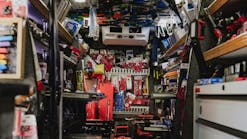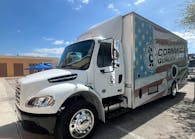Q:Are any tool dealers making any money selling shop owners big ticket items like tire service equipment, compressors, or lifts? Is it not worth the time, effort, or headaches? Or am I missing an opportunity? If there’s money in it, where do I start?
A: “Are you stepping over dollars to pick up nickels?” asks Steve Perlstein, sales and marketing manager at Mohawk Lifts. He feels many dealers can get too focused on tool sales to take advantage of capital equipment sales opportunities.
If you aren’t selling capital equipment, you’re missing out on profitable business. Capital equipment sales won’t just put more dollars in your pocket, it will put it there faster – without fussing on weekly collections or risking slow pays or skips, since you don’t need to carry it.
If you’re like most dealers, you visit close to a hundred shops a week. That puts you in the perfect position to sell shop owners and/or managers who make hundreds of thousands of dollars in capital equipment decisions a year. Because you see these decision makers every week, you can know their capital equipment needs first. But to benefit from that advantage, you need to build a relationship with them and be proactive.
“Every January you should ask the shop owner what’s on his ‘wish list’ for the year,” says Mohawk’s Perlstein. Be sure to keep an up-to-date list and follow up on it. “And you don’t need to just ask at the beginning of the year. Every so often you should be asking about items on your list and adding new items to it.”
Once an owner starts shopping for capital equipment, you should be asking questions about what they want, what brands they’re considering, and when they plan to make their decision.
You could then contact a local equipment dealer and hand off the sale for a percentage.
“But why would you want to do that?” asks Perlstein. You’re in the best position to close the sale: your customer already knows and trusts you. And you’ll earn much more closing the deal yourself. Handing off a sale will likely also cut you out of the loop for future capital equipment sales.
If you’re with a flag, you likely have access to several capital equipment programs. It’s good to be familiar with those programs since they’ll likely provide you with sales tools and financing to help you close your deal. Many equipment programs give you a toll-free hotline you can call with pre-sale technical questions – so you’re not alone.
“If you’re competing against other dealers, they’re all likely selling the same products from the same manufacturers,” says Perlstein. This can move things from salesmanship into a bidding war. If you want to be more competitive and profitable, consider selling something different by working directly with some manufacturers, he suggests. (The manufacturer will likely offer financing. If not, I offer some options below.)
And no matter what route you choose, you don’t need to worry about equipment set-up or installation. If you or your customer aren’t comfortable or qualified to do an installation, most manufacturers have a nationwide network of experts who can do it for you for a fee.
Once you sell your first piece of capital equipment, the rest will become a piece of cake – and you’ll be taking home a bigger piece of the pie.
Q: I’m an independent. The biggest hurdle to selling more expensive items like compressors to shop owners or toolboxes to techs is putting together the financing. I’m not going to carry them on a price tag that big. And the finance companies I’ve contacted either charge customers a fortune, extend credit only to business owners, or require an in-person loan application. Any advice?
A: There are several options for financing capital purchases (aside from joining a flag).
A business owner may prefer a bank loan to get better terms. However, many business loans today take a long time to clear, carry exorbitant fees and require personal guarantees. This may make a bank loan less than desirable.
Credit card financing is another option for shop owners or technicians. Although interest rates can be steep, your customer may have an offer for very low or zero percentage teaser rates for a short period of time. The downside? It will cost you a couple points to process his credit card on your merchant account and your customer could be socked with huge interest rates if he can’t pay off his purchase before the promotional period ends.
A better option may be for you to establish a relationship with a financing company. Your customer benefits from the ease of financing and you can be involved in the process, so you don’t have to send a customer away and wait for him to get approved.
Companies like Everlasting Capital (everlastingcapital.com) offer for financing what Expedia.com offers for travel. It gives your customers options.
A dealer can establish a no-cost account with a company like Everlasting Capital and process a customer’s application over the Internet. Customers can choose from a menu of financing options based on their preferences and credit rating.
It takes from a couple minutes to approve the average purchase under $10,000 to a couple hours to approve most purchases over that amount. Everlasting Capital offers financing options for anything from capital equipment for shop owners to personal equipment for a technician, according to company president Josh Feinberg. The minimum financed amount is as low as $500.
There are many options available through financing companies, including traditional financing, leasing with a buyout and lease-to-own options without a buyout. Everyone’s situation is different, so there isn’t a best option that fits everyone. But leasing can often offer lower terms and can have tax benefits (it’s best for them to ask their account about that).
Don’t let all the options overwhelm you. Your job isn’t to be a financial expert; it's to give your customers' options so they can choose what’s best for their situation.



